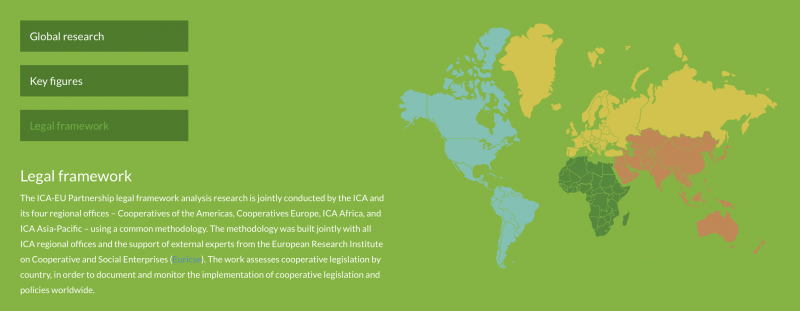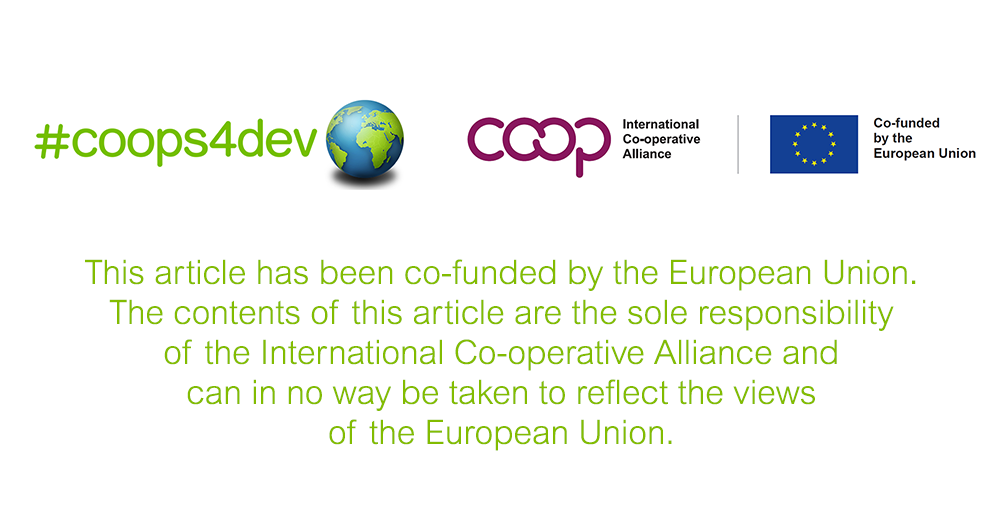
The legal landscape at national and regional level is crucial to an adequate enabling environment for cooperatives: whilst regulations acknowledging cooperatives’ specificities and ensuring a level playing field with other types of enterprise can support cooperatives, the lack of a specific legal framework or a weak legal framework for cooperatives may impede their development in a given territory.
Given the importance of a supportive legal framework for cooperatives, the ICA-EU Partnership on cooperative development (#coops4dev?) has launched a long-term global research project analysing cooperative law by country – a research jointly conducted by the ICA and its four regional offices using a common methodology. So far, 46 countries have been analysed by national legal experts across the four regions of ICA – i.e. Africa, Americas, Asia-Pacific and Europe. All national reports are easily available to download on an interactive map on the coops4dev website.
The legal framework analysis not only documents and monitors cooperative legislation worldwide, but it also provides a constructive assessment and a list of key recommendations to improve the recognition and support given to cooperatives in a specific country. All in all, the different reports allow the reader to grasp the legal context in every country. Some striking aspects can be found in the following examples.
In Nepal, which is a country with approximately 34,737 cooperatives and 6.5 million cooperative members, the single law that regulates cooperative associations in the country – the Cooperative Act of 2017 - has started a new phase in Nepal’s cooperative movement, by providing an opportunity to increase the capacity of the movement in an effective, productive and competitive manner. Nepali cooperative legislation is considered to be quite cooperative friendly and the key reason for this is that the Act was made in consultation with the cooperative federation and confederation.
Three laws make up the Ugandan legal framework on cooperatives: The Cooperative Societies Act Cap 112; the Tier 4 Microfinance and Money Lenders Act, 2016, and The Microfinance Deposit Taking Institutions Act, 2003. As Uganda has up to 21,346 registered cooperative societies and an estimated 5.6 million members, the analysis recommends that Uganda’s cooperatives should be uniformly registered, licensed and managed under a single legal regime to avoid fragmentations in the regulation of certain sectors, such as Savings and Credit Cooperatives (SACCOs). The report also recommends a reduction in the minimum required number of members in primary cooperatives - the current minimum required number is 30 - to ensure that groups of professionals like lawyers can form a cooperative without struggling to raise the required minimum number of members.
In Germany – a country with approximately 7,319 registered cooperatives and over 22.5 million members-, the law on cooperatives is notable for its flexibility, which allows for innovation and for new forms of cooperatives to develop. Auditing requirements also ensure that cooperatives are integrated into a strong vertical network, protected against hostile takeovers, and rarely go bankrupt.
Accounting for 8,618 cooperatives and almost 18 million cooperative members, Argentina’s cooperative businesses are regulated by the national law Nº 20.337 called Law of Cooperatives (LC). According to the key recommendations mentioned in the analysis, some improvements could be achieved by explicitly recognising the cooperative difference in contrast to profit-driven companies and by simplifying and accelerating the administrative procedures for the legal constitution and statute reforms of cooperatives.
As acknowledged in the Argentinian report, the insights provided by this project will assist advocacy initiatives developed by ICA offices and members to promote advantageous regulations for cooperatives both in the country object of the analysis as well as in other countries and regions.





